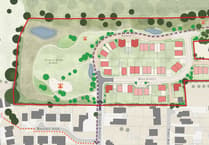With nearly half of all dogs in the UK (45%) showing signs of anxiety when they hear fireworks, the RSPCA has published some simple guidelines on how to help pets feel safe.
Whether it is a dog, a cat or another little pet, planning ahead can pay dividends.
• Make sure your dog or cat has somewhere to hide - perhaps under some furniture or in a cupboard - and can get to it at any time.
• Ensure your pet is kept in a safe and secure environment and can’t escape
• Make sure your pets are microchipped in case they do escape
• During fireworks season, walk dogs during daylight and keep pets indoors when fireworks are likely to be set off
• At nightfall, close windows and curtains and put on music to mask and muffle the sound of fireworks
RSPCA animal behaviour expert Dr Samantha Gaines said: “Firework phobia in pets is a treatable condition and we recommend seeking advice from your vet so that you can plan ahead and help your pet cope around firework season. For example, if your dog is frightened of fireworks your vet may suggest referral to a clinical animal behaviourist to teach him/her to deal with the sounds, or the use of diffusers which disperse calming chemicals into the room.
“It is also a good idea to provide your dog with a safe haven. It is best to get your dog used to this before the season starts. Choose somewhere quiet and help them to learn that being there is positive and that no harm will come to them. You can do this by giving them toys or a variety of chew toys.
“And if you are using fireworks yourself, please only do so on traditional celebration dates like Bonfire Night, when most animal owners will be expecting fireworks and will hopefully have made preparations to help their animals cope.”
Figures from the RSPCA show hundreds of calls are made about fireworks every year to the charity. Last year, (2016) 345 calls were logged in just October and November alone.
Sadly, it is not only companion animals that are affected by fireworks. Farm animals also can be easily frightened by loud noises and sudden flashes of bright light, which can startle them and cause them to injure themselves on fencing, farm equipment or, in the case of housed animals, on fixtures and fittings within the house. Further, wildlife can be burnt alive after making their home in bonfires.
For advice on how to minimise anxiety and keep pets safe on Bonfire Night, visit: www.rspca.org.uk/adviceandwelfare/pets/general/fireworks





Comments
This article has no comments yet. Be the first to leave a comment.